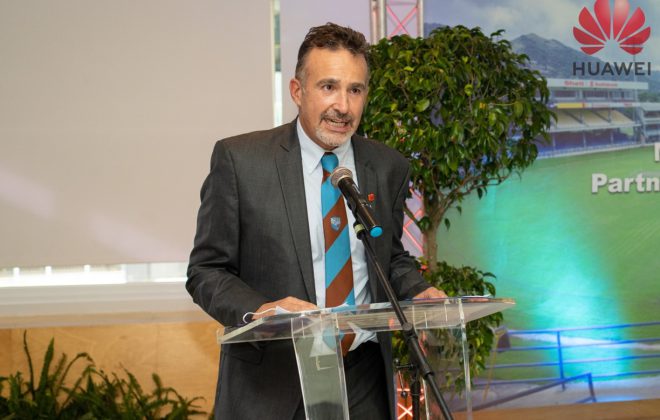CANTO Weekly Newsletter – BNamericas
Friday, May 11, 2018
CWC widens loss, posts RGU growth – Regional
Liberty Latin America revenues down on hurricane impact – Regional
Caribbean firms rush to make data GDPR compliant – Regional
ICT tender watch: El Salvador’s e-passports, Nicaragua’s health equip – El Salvador, Nicaragua
Costa Rica’s newly sworn-in president keeps telecom deputy minister – Costa Rica
CWC widens loss, posts RGU growth – Regional
Cable & Wireless Communications (CWC), a leading Caribbean telecoms and video provider, reported 25,100 new revenue generating units (RGUs) in the first quarter, a solid increase from 9,900 a year earlier, but it widened its loss to US$39mn from US$4.2mn in 1Q17.
The Liberty Latin America unit said the result was mostly due to higher restructuring charges, as well as exchange losses and higher tax expenses.
“On a rebased basis, revenue was relatively flat at US$589 million during Q1 as compared to the corresponding prior-year period,” it added.
CWC, which operates telecoms consumer services across Panama, Jamaica, Trinidad, Bahamas, Curacao and the Cayman Islands, among others, said in a statement that of the new adds, 14,000 RGUs were new broadband clients, while the rest included 3,400 new video RGUs and 7,900 new fixed-line telephony clients.
“Broadband additions nearly doubled those in the prior-year period, led by Jamaica, Panama and Trinidad,” the London-based company said.
It also reported a loss of 19,800 mobile subscribers in the quarter, compared to a 26,000 gain in the same quarter of 2017.
CWC offers services to 3.4mn mobile clients, as well as 0.6mn internet, 0.6mn fixed-line telephony and 0.4mn video subscribers.
Liberty Latin America revenues down on hurricane impact – Regional
Liberty Latin America (LLA) posted a 3.5% drop in revenue in Q1 to US$910mn, as gains in Chilean cable company VTR could not offset losses from the Cable & Wireless Communications (CWC) and Liberty Puerto Rico units due to damage from hurricanes Irma and María.
In its second income statement since splitting off from Liberty Global last December, LLA said Liberty Puerto Rico revenues fell US$45mn in the first quarter, although sales are now returning to pre-hurricane levels as infrastructure is rebuilt.
“In Puerto Rico, our team has continued to work tirelessly to rebuild the network, which is now mostly complete,” CEO Balan Nair said in a statement.
“Our sales are back at pre-hurricane levels and nearly all of our B2B customers are connected. We expect that our performance in Puerto Rico will continue to improve throughout the year.”
Liberty Latin America’s operating profit fell 27% to US$98mn due to higher restructuring charges and a 5.3% fall in organic operating cash flow, attributed to a hurricane-related US$33mn fall at Liberty Puerto Rico.
LLA added 33,300 RGUs in the first quarter compared to 41,900 a year ago, as RGU gains of 25,100 at CWC and 23,600 at VTR were offset by a 15,400 RGU decline in Puerto Rico.
In terms of mobile, subscribers declined by 11,000 mainly in the prepaid segment due to declines in Jamaica and the Bahamas, and partially offset by 9,000 postpaid additions in Chile.
Chile’s VTR saw 15% growth in revenues to US$264mn related to increases in residential cable subscriptions, subscriber growth for its mobile services and B2B subscription growth.
CWC’s revenues declined 1.7% to US$585.5mn, hit by a drop in mobile revenues, with tough competition in Jamaica, Panama and the Bahamas.
Liberty’s revenue fell 42.1% y-o-y to US$61.8mn, but was up from US$17mn in 4Q17after reconnecting 589,000 RGUs as of May 4, an increase of 129,000 RGUs from February 8, with nearly all B2B customers back online.
Caribbean firms rush to make data GDPR compliant – Regional
Financial institutions in Caribbean territories under European Union jurisdiction are gearing up to implement the EU’s General Data Protection Regulation (GDPR) by the May 25 compliance deadline.
Under the regulations, individuals have the right to access and review their personal data. The company collecting the information must correct all inaccuracies and erase any information that an individual requests to be removed or redacted. Individuals can also object to being solicited through direct marketing based on information collected, and can move data collected to another entity.
The regulations will go into effect in the Caribbean’s Dutch, French and British territories, all of which fall under EU jurisdiction.
As part of its efforts to urge financial institutions towards compliance, the Caribbean Association of Banks (CAB) warned financial institutions that “failure to comply has far reaching implications for entities and their business operations.”
CAB stressed that entities in breach of highly important data face fines that can reach up to 4% of its global gross turnover or 20mn euros (US$24.8mn). A less critical data breach could still result in a fine of 2% of global gross turnover or 10mn euros.
According to a GDPR benchmarking survey conducted by Deloitte, only 15% of organizations surveyed expect to be fully compliant by May, with many scrambling to implement appropriate measures.
A Bahamian information manager, speaking to Bahamas news outlet Tribune, called on local firms to act quickly towards GDPR compliance to avoid the fines.
“How companies collect, store and eventually destroy data from agencies or organizations in the EU member states will be further scrutinized once the new GDPR regulations come into effect this month,” said Chris Sawyer of Sunryse Information Management.
“Businesses in the Bahamas must look at their overall process and have a handle on what personal information is being gathered from clients, be that names, e-mail addresses, credit card details, banking information, insurance details or any other personal details specific to that individual,” he added.
“There also has to be a clear understanding of the chain of command as the data moves from the customer through various channels within your organization,” said Sawyer. “Once collected, it is also important to determine how a company manages the information now in its possession. Careful consideration should be given to obtaining consent from clients when passing client data between entities.”
Caribbean financial leaders will be meeting to discuss GDPR compliance in Suriname on May 21 to 23 at an event initiated by the Caribbean Telecommunications Union (CTU) and CARICOM.
“The onus is on European companies doing business with anyone in our region to ensure that whoever they do business with have measures in place that will enable them to remain compliant with the GDPR. For the Caribbean, it is urgent for us to understand what requirements will be placed on us,” said Nigel Cassimire, Telecommunications Specialist at CTU), as quoted in Trinidad and Tobago-based tech blog Sightline.
ICT tender watch: El Salvador’s e-passports, Nicaragua’s health equip – El Salvador, Nicaragua
The El Salvadoran government is looking for integrated solutions for the production and delivery of electronic passports, as well as related hardware and data management systems.
The tender is conducted by the United Nations Development Programme (UNDP) on behalf of government project “Towards a security mobility: Innovation in the issuance of the passport of the Republic of El Salvador”.
Eligible legal entities are invited to express interest in a sealed envelope and submit it by May 14 to the address shown below.
Tender details and prequalification documents can be found on the UNDP website.
Programa de las Naciones Unidas para el Desarrollo
Edificio Naciones Unidas, Boulevard Orden de Malta Sur No. 2-B, Santa Elena, Antiguo Cuscatlán, La Libertad.
Telephone: (503) 2263-0066
***
The Nicaraguan health ministry seeks IT equipment to supply basic health attention units as part of a program to modernize the country’s health system, in a tender partially financed with a loan from the Inter-American Development Bank (IDB).
The ministry invites eligible bidders to submit sealed proposals to the address indicated below no later than 10am on June 25. All bids must be accompanied by a “Bid Maintenance Statement “.
A set of bidding documents, in Spanish, is available for US$20 and upon the submission of a written request to the same address.
Interested companies may also obtain additional information by writing to Tania Isabel García, at adquisiciones@minsa.gob.ni and adquisiciones19@minsa.gob.ni.
Ministerio de Salud.
Costado oeste de la Colonia 1ro. De mayo
Auditorio de la División General de Adquisiciones
Costa Rica’s newly sworn-in president keeps telecom deputy minister – Costa Rica
Costa Rican President Carlos Alvarado (pictured), who was sworn in on Tuesday, will keep current telecoms deputy minister Edwin Estrada as part of his team, according to his campaign website, as the new administration faces a series of challenges to modernize the country’s telecoms infrastructure.
Estrada has been in charge of the telecommunications deputy ministry since May 2016, under then president Luis Guillermo Solís, who like Alvarado belongs to the PAC party.
Local media reports have said that the new president faces several challenges in the telecoms sector, including a delayed analog switch-off for broadcast TV and the need for more spectrum for both commercial, broadband services as well as for security applications.
Alvarado, a 38 year-old journalist, has announced a telecoms program centered around taking advantage of the digitalization of TV transmissions, the defense of net neutrality and the establishment of information and communications access as a human right among the country’s 5mn residents.
He has also proposed transforming the country into a regional data hub, leveraging state-owned energy and telecoms company ICE for that purpose, as well as an ambitious fiber-to-the-home initiative.
The information presented and opinions expressed herein are those of the author and do not necessarily represent the views of CANTO and/or its members


